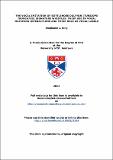The vocal imitation of bottlenose dolphin (Tursiops truncatus) signature whistles: their use in vocal matching interactions and their role as vocal labels
Abstract
The bottlenose dolphin uses vocal learning to develop its own unique acoustic signal. This signal encodes the identity of the signaller, and is known as the animal’s signature whistle. The dolphin’s ability for vocal learning means that the signature whistle of one animal may be found in the vocal repertoire of other animals. This copying of signature whistle types may allow conspecifics to label or address one another. This thesis investigated the use of signature whistle copying in both captive and
wild animals. Dolphins have been known to rapidly imitate each other’s signature whistle in vocal matching exchanges. This matching of sounds has an aggressive connotation in songbirds, yet the function in bottlenose dolphins remains unclear. I have shown, through playback experiments with
captive animals, that signature whistle matching in dolphins is not aggressive but appears to be affiliative, and may be used as a tool to initiate contact with the signature whistle owner. In addition, the rapid matching of whistle types in wild dolphins appears to play a specific role in their foraging behaviour, indicating the function of vocal matching may indeed be multi-faceted. This thesis also
uses a unique dataset to extensively describe the occurrence of signature whistle copying in wild animals. The imitation of individual signature whistles occurred almost exclusively between close associates during separations. All copies were accurate representations of the original signature
whistle, but were clearly recognisable due to fine-scale differences in selected acoustic parameters, and are therefore unlikely to be used deceptively. Finally, I provide evidence that wild bottlenose
dolphins respond to hearing a copy of their own signature whistle by calling back. This offers support to the notion that signature whistles function as distinctive labels that are used to address individuals, and perhaps even label them referentially.
Type
Thesis, PhD Doctor of Philosophy
Collections
Items in the St Andrews Research Repository are protected by copyright, with all rights reserved, unless otherwise indicated.

